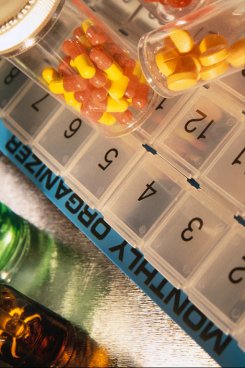 Johns Hopkins scientists say an inexpensive acne antibiotic in use since the 1970s can target HIV infected immune cells and prevent the virus from reactivating and replicating. Writing about their work in The Journal of Infectious Diseases, the researchers say the drug, minocycline, will likely improve on the current treatment regimens of HIV-infected patients if used in combination with the standard drug cocktail known as Highly Active Antiretroviral Therapy (HAART).
Johns Hopkins scientists say an inexpensive acne antibiotic in use since the 1970s can target HIV infected immune cells and prevent the virus from reactivating and replicating. Writing about their work in The Journal of Infectious Diseases, the researchers say the drug, minocycline, will likely improve on the current treatment regimens of HIV-infected patients if used in combination with the standard drug cocktail known as Highly Active Antiretroviral Therapy (HAART).
"The powerful advantage to using minocycline is that the virus appears less able to develop drug resistance because minocycline targets cellular pathways not viral proteins," says researcher Janice Clements. "The big challenge clinicians deal with now in this country when treating HIV patients is keeping the virus locked in a dormant state. While HAART is really effective in keeping down active replication, minocycline is another arm of defense against the virus."
Unlike the drugs used in HAART which target the virus, minocycline homes in on, and adjusts T cells, major immune system agents and targets of HIV infection. According to Clements, minocycline reduces the ability of T cells to activate and proliferate, both steps crucial to HIV production and progression toward full blown AIDS.
"Since minocycline reduced T cell activation, you might think it would have impaired the immune systems in the macaques, which are very similar to humans, but we didn't see any deleterious effect," added co-researcher Gregory Szeto. "This drug strikes a good balance and is ideal for HIV because it targets very specific aspects of immune activation."
Early success with animal tests prompted the team to study in test tubes whether minocycline treatment affected latency in human T cells infected with HIV. Using cells from HIV-infected humans on HAART, the team isolated the "resting" immune cells and treated half of them with minocycline. Then they counted how many virus particles were reactivated, finding completely undetectable levels in the treated cells versus detectable levels in the untreated cells.
"Minocycline reduces the capability of the virus to emerge from resting infected T cells," Szeto explains. "It prevents the virus from escaping in the one in a million cells in which it lays dormant in a person on HAART, and since it prevents virus activation it should maintain the level of viral latency or even lower it. That's the goal: Sustaining a latent non-infectious state."
Related:
HIV boffins look to slow-progressors for antibody recipe
Herpes Drug Reduces HIV Infectiousness
AIDS/HIV - Treatment Research
Source: The Johns Hopkins University





